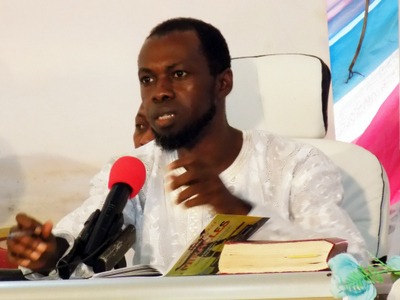The Challenge of Destiny
By: Elder Enoch Ofori Jnr
(Sabbath, 22nd October, 2011)
It’s common knowledge that nothing good comes cheap. As a matter of fact, no worthwhile achievement in this life has ever seen the light of day in the absence of hard work and commitment. Take career development, for example. It’s often the case that those who climb to the top of their professions don’t get there by the easy route of truancy or laziness but by the road of hard work, commitment and sacrifice.
So, why not the Christian called to receive eternal riches? It’s sad that while many Christians are keen to accept their calling into blessing, they are not so keen to take on the challenges that go with it. Even the Lord Jesus Christ would not enter His glory without first dealing with the prior challenge head-on.
He first had to drink the “cup” of suffering (Matt. 20:23) before He would be crowned with glory. We read in Heb 12:1-2:
“Wherefore seeing we also are compassed about with so great a cloud of witnesses, let us lay aside every weight, and the sin which doth so easily beset us, and let us run with patience the race that is set before us, Looking unto Jesus the author and finisher of our faith; who for the joy that was set before him endured the cross, despising the shame, and is set down at the right hand of the throne of God”.
The same goes for true believers: “we must through much tribulation enter into the kingdom of God” (Acts 14:22). Here, as identified elsewhere in the scriptures, the destined glory is “the kingdom prepared for the people of God from the foundation of the world” (Matt. 25:34), and the challenge is the persecution to endure.
Great People Act Great
Given that it’s a person’s destiny that necessitates the kind of challenge (s) he will have, it stands to reason that one cannot run away from the latter if he truly desires the former.
This was the simple truth Joshua made clear to the descendants of Joseph during the division of the land of Canaan among the tribes of Israel:
“And Joshua spake unto the house of Joseph, even to Ephraim and to Manasseh, saying, Thou art a great people, and hast great power: thou shalt not have one lot only:
“But the mountain shall be thine; for it is a wood, and thou shalt cut it down: and the outgoings of it shall be thine: for thou shalt drive out the Canaanites, though they have iron chariots, and though they be strong” (Joshua 17:17-18).
In calling the house of Joseph “a great people”, Joshua was not patronizing them; he was only reaffirming their prophetic destiny of greatness conferred on them by the patriarch Jacob on his dying bed. In blessing Joseph and his two sons Ephraim and Manasseh before his death, Jacob had crossed his hands and laid his right hand on the head of the younger son Ephraim and the left on Manasseh, the elder. Displeased with his father’s gesture in putting the younger son before the elder, Joseph tried to reposition his father’s hands ‘correctly’, protesting: ‘”Not this way, my father; since this one is the firstborn, put your right hand on his head’” (Gen. 48:17 ESV).
Yaakov (Jacob), of course, refused; he knew what he was doing. He said to his son Joseph as he proceeded to bless his grandsons: ‘”I know, my son, I know. He also shall become a people, and he also shall be great. Nevertheless, his younger brother shall be greater than he, and his offspring shall become a multitude of nations.’ So he blessed them that day, saying, ‘By you Israel will pronounce blessings, saying, ‘God make you as Ephraim and as Manasseh.’ Thus he put Ephraim before Manasseh” (vv. 19-20).
So the blessing of greatness is for both sons, only the younger son will be comparatively “greater”. Thus when the descendants of “great” Ephraim and Manasseh complained to Joshua that the territory allotted to them in the land of Canaan was too small for their “great” numbers (Josh. 17:14), he rightly referred them to look to their ‘destiny of greatness’ in their desire for a “great” territory, knowingly playing on the word “great”: “And Joshua answered them, If thou be a great people, then get thee up to the wood country, and cut down for thyself there in the land of the Perizzites and of the giants, if mount Ephraim be too narrow for thee” (v. 15).
In short, Joshua told them, ‘great people act great’. So get down to the business of expanding your territory in the strength of your greatness: go up to the wooded mountain located within enemy territory and carve up for yourself your great territory.
It had come to the crunch: justify your great size and your great destiny. But now the “great” people of the house of Joseph baulked at the prospect of fighting enemies with superior weaponry. They answered Joshua: “The hill is not enough for us: and all the Canaanites that dwell in the land of the valley have chariots of iron, both they who are of Bethshean and her towns, and they who are of the valley of Jezreel” (v. 16).
What a parody of a destiny of greatness!
Yes, the descendants of Ephraim and Manasseh were “great” in fulfilment of their divine prophetic destiny of greatness, yet they weren’t prepared to take up the ‘great challenge’ that went with their great destiny—fighting enemies who were armed with “chariots of iron’!
Joshua remained unconvinced, however, and insisted they couldn’t run away from the challenge of destiny, as earlier noted: “Thou art a great people, and hast great power: thou shalt not have one lot only: But the mountain shall be thine; for it is a wood, and thou shalt cut it down: and the outgoings of it shall be thine: for thou shalt drive out the Canaanites, though they have iron chariots, and though they be strong” (vv. 17-18).
True to Joshua’s words, the challenge of destiny would not be evaded. The “great” house of Joseph, acting confidently (‘great’) with faith in God, duly took up their ‘great’ challenge, after the death of Joshua, and fought the Canaanite enemies standing between them and their ‘great’ territory, and they prevailed (Judges 1:22-29). They fulfilled their destiny of greatness!
As a believer, do you know your destiny, and are you prepared to take up the challenge you must necessarily take up to fulfill your destiny?
In case, you didn’t know, you are also called to be “great” and “greater” like Manasseh and Ephraim. The Lord Jesus, reading an element of disbelief into Philip’s request to “show us the Father, and it is enough for us’” (John 14:8 ESV), answered:
‘”Have I been with you so long, and you still do not know me, Philip? Whoever has seen Me has seen the Father. How can you say, ‘Show us the Father’?
“Do you not believe that I am in the Father and the Father is in me? The words that I say to you I do not speak on My own authority, but the Father who dwells in Me does His works.
“Believe Me that I am in the Father and the Father is in Me, or else believe on account of the works themselves.
‘”Truly, truly, I say to you, whoever believes in Me will also do the works that I do; and greater works than these will he do, because I am going to the Father’” (vv. 9-12 ESV).
Unwavering faith in Christ bestows a destiny of greatness. Indwelt by the Father and His Son (John 14:20, 23) who “alone do great wonders” (Ps 136:4), the believer is surely destined to do “greater works”.
“Greater works” than Christ did! Ponder over what that means for a few minutes. It’s positively mind-bogglingly! But the good news is that God has not called us to fulfill our destiny of greatness in Christ all by ourselves. He gives us power to do it: “But ye shall receive power, after that the Holy Ghost is come upon you: and ye shall be witnesses unto Me both in Jerusalem, and in all Judaea, and in Samaria, and unto the uttermost part of the earth” (Acts 1:8).
The call to “greater works” is linked to the sphere of operation—it is far “greater” than the one Christ operated in. Christ’s earthly ministry was pretty much limited to Galilee and Judea (Matt. 4:17, 23-15); He was to all intents and purposes “a minister to the circumcision [i.e. Jews]” (Rom. 15:8). But His disciples are to spread the Gospel not only in “all Judea and in all Samaria”, but also to “the farthest parts of the earth” (NET).
It’s time to act as a great people destined to do “greater works”!
The Challenge Destiny Imposes
Knowing that their destiny of greatness would not be fulfilled until they met the challenge that came with it, the early Church devoted themselves to prayer until they were endued with “power from on high” on the day of Pentecost (Acts 1:13-14, 2). And it was not a one-off engagement; there was a commitment to meeting the challenge all the time. Unceasing prayer was a custom (Acts 2:24, 2:24, 31), and the result was that “with great power gave the apostles witness of the resurrection of the Lord Jesus: and great grace was upon them all” (Acts 4:33).
As part of the manifestation of the “great power” and “great grace” at work in the early apostles, Peter’s shadow healed the sick, a deed which was unquestionably a “greater work”. (Acts 5:12-16). When great people act great, they do fulfill their destiny.
What was true of the first apostles was also true of the Apostle Paul who was called and destined to be a ‘great’ apostle (Acts 9:15) in his own right: “I am the least of the apostles, that am not meet to be called an apostle, because I persecuted the church of God. But by the grace of God I am what I am: and his grace which was bestowed upon me was not in vain; but I laboured more abundantly than they all: yet not I, but the grace of God which was with me” (1 Cor. 15:9-10).
Paul was destined for outstanding apostleship, and he rose to the challenge which accompanied it: “he laboured more abundantly than they all”, availing himself of the grace of God equally bestowed on him abundantly (see 1 Tim. 1:12-14; 2 Cor. 12:9).
The apostle is not lost in a delirium of self praise. He paid a great price in sacrifice and total dedication.
He gave up everything else in order to gain “the excellency of the knowledge of Christ Jesus” (Phil. 3:8). Before embarking on full time ministry, he recognized that spiritual preparation was an absolute necessity; he therefore did not consult “flesh and blood” but went to Arabia to seek the face of the Lord (Gal. 1:15-18).
Then, he set out in faith, propelled by hard work and strength from the grace of God. He writes of the great milestones his ministry chalked up in Rom. 15:
“… I will not dare to speak of any of those things which Christ hath not wrought by me, to make the Gentiles obedient, by word and deed,
“Through mighty signs and wonders, by the power of the Spirit of God; so that from Jerusalem, and round about unto Illyricum, I have fully preached the gospel of Christ.
“Yea, so have I strived to preach the gospel, not where Christ was named, lest I should build upon another man’s foundation” (vv. 18-20).
Paul’s destiny to great ministry was fully realized because he faced up to the challenges that came with it.
As a Christian called to “greater works”, it’s time to ask yourself if you are not ‘wasting’ the grace of God given to you because you refuse to act great as expected (See Rom. 12:6; Eph. 4:7). Understand that the grace of God has been given to you for the purpose of putting it to use (Rom. 12:6-8). So receive it not in vain (2 Cor. 6:1)!
But that’s exactly what you will end up doing unless you act on the challenges of your calling. Don’t be like “the unprofitable servant” who hid his talent as a means of ducking out of the challenge of putting his talent to profitable use (Matt. 25:14-30).
Like the challenge the descendants of Ephraim and Manasseh faced, most of the challenges destiny thrusts upon us are in the form of an uphill task (it’s not the plain but “the mountain”). To take full possession (including “the outer limits” of it), you shall climb and cut down the wood.
But it’s not only the rough terrain that so dampens the spirits; redoubtable enemies (having “iron chariots) are determined to scuttle all your efforts to realize your destiny. Those enemies, unless overcome, effectively keep your destiny of greatness out of reach; they stand between you and the blessing. You will have to fight and drive them out or your inheritance remains impounded by them!
As N.T. believers we need not be reminded who those formidable enemies are. They are the unseen forces of darkness who daily fight us to stop us from reaching the full potential of our destiny of greatness in Christ.
As flesh and blood and they as “principalities, powers, and the rulers of the darkness of this world” (Eph. 6:12), the demonic enemies are, ordinarily speaking, mightier than us, but still we must fight them; we must not flinch from engaging them in battle because GREATER is the Captain of our Salvation in us than they (1 John 4:4)! Moreover, He has furnished us with far superior weapons which are “mighty through God to the pulling down of strongholds” (2 Cor. 10:3-4)!
So the devil will snarl and roar madly at you, but you will fulfill your destiny’s call. The challenge is to resist him while remaining firm in your faith, unshaken and unmoved by anything (1 Pet. 5:8-9). And, of course, you must “pray without ceasing” (1 Thess. 5:17; Eph. 6:17-18). The old saints understood the challenge of facing down the devil; indecision and vacilation would not do but tenacity—holding out against the devil to the point of death (Rev. 12:11)!
No Fight no Crown
Are you prepared to follow the example of the saints of old and fulfill your destiny no matter the costs? For the Christian, the great challenge is to “fight the good fight” and then “lay hold on eternal life” which is the believer’s destiny foreordained by God for him in Christ (1 Tim. 6:12). For the Apostle Paul this was his overriding goal in life. Thus he single-mindedly fought the “good fight, “finished” his course, and kept the faith”. What he awaits is “the crown of righteousness” promised not only to him but to all who love the Lord (2 Tim. 4:7-8; cp Jam 1:12).
When the challenge of destiny is duly dealt with, destiny is fulfilled. According to Gal. 3:14, the believer is blessed in Christ with “the blessing of Abraham”, but the challenge is to act confidently as such with a mindset of success in everything we do. Because we are destined to be “the head and not the tail” (Deut. 28:13), we aren’t going to fail if we act; an outcome of success was already guaranteed before we were born.
However, success will not materialize without effort and without commitment and hard work. It’s a principle that applies as much to our spiritual life as it does to our physical life. As the Master Himself set a personal example for us, the challenge is that we must “work while it’s day” (John 9:4).
Beloved, your destiny of blessing (1 Pet. 3:9) is meant to be lived out, so rise to the challenge of destiny and fulfill it. That’s how all the ancient people of God lived and realized their glorious destinies. May the God of all grace help all of us to fulfill the purpose for which He called us (Rom. 8:28). Amen!



